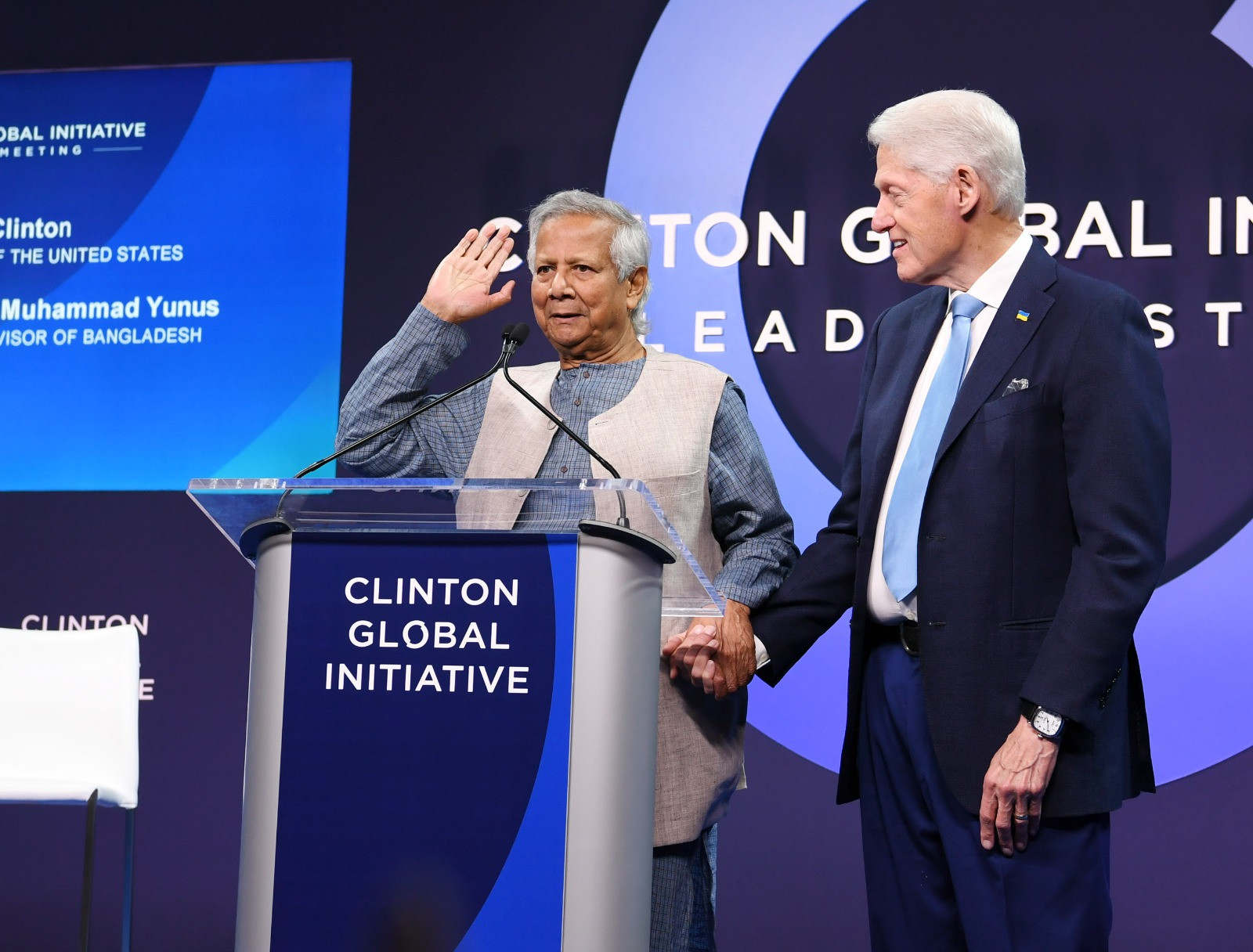
Though branded in Western media as a success story, Bangladesh shows eery parallels to Syria
[See CovertAction Magazine’s previous coverage of the August 2024 color revolution in Bangladesh here.—Editors.]
In 2024, The Economist magazine named Bangladesh as its “country of the year,” stating that it had “improved the most” of any other country in the world over the previous 12 months.
The watershed event in that time was a series of demonstrations during the summer that resulted in the toppling of Sheikh Hasina, the daughter of Bangladesh’s founding father Bangabandhu Sheikh Mujibur Rahman who had ruled the country for 20 of the past 30 years.
Sheikh Hasina was opposed by the U.S. government because she established strong relations with China, and resisted U.S. efforts to establish a military base on Saint Martin, a strategic island off the coast of Bangladesh, and to allow use of ports by the U.S. military in an attempt to counteract China’s use of ports in neighboring Myanmar.
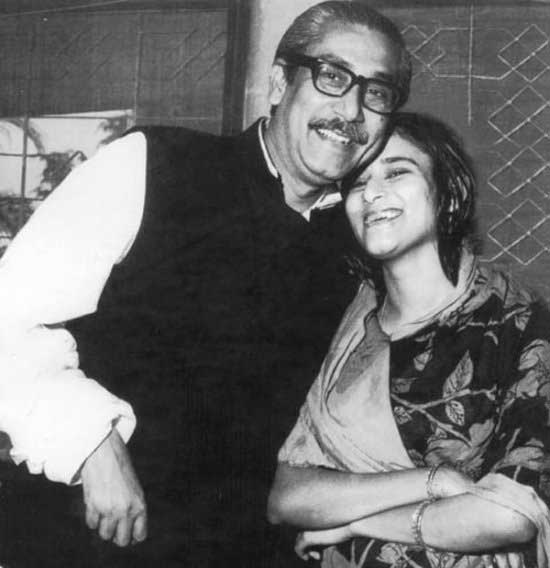
Donald Lu, the Assistant U.S. Secretary of State for South and Central Asian Affairs, visited Bangladesh to encourage the opposition a few months before the coup and Biden administration-imposed sanctions on government officials to try to weaken Hasina’s regime. Additionally, the National Endowment for Democracy (NED) funded NGOs and education institutions and trained activists and students who participated in the uprising that led to Hasina’s ouster.[1]
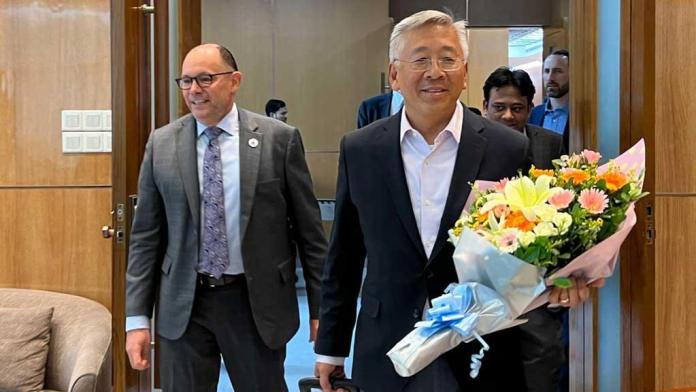
Hasina’s replacement, Muhammad Yunus, was a donor to the Clinton Foundation and a darling of the global financial elite. His Grameen Bank pioneered the issuance of micro-finance credit loans that provided a substitute for structural reforms that would redistribute wealth. Since these loans have often been given at high interest, they have routinely plunged vulnerable people into crippling debt.[2]
The Council on Foreign Relations echoed The Economist in proclaiming in a January 2025 report warning about the Trump administration’s freeze on foreign aid to Bangladesh that “Bangladesh’s pro-democracy protestors forced out a dictator last year, and the caretaker leader, Muhammad Yunus, is truly dedicated to reforming and rebuilding the country.”
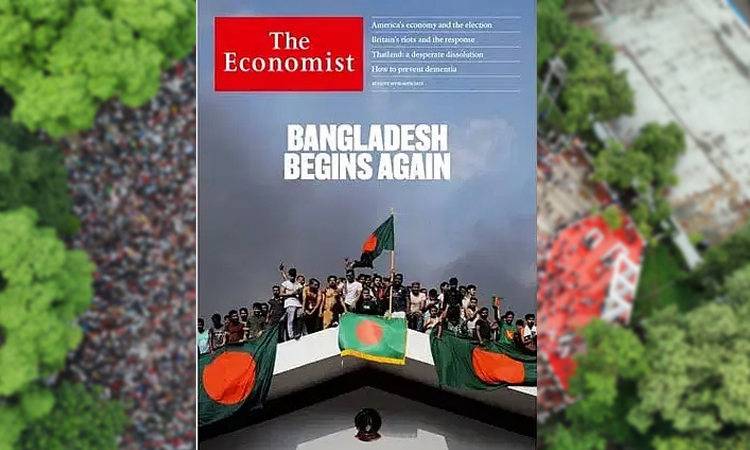
This assessment, along with that of The Economist, is contradicted in a statement made by Mohammad Harun Al Rashid, former Bangladeshi ambassador to Morocco, who described the worsening conditions in Bangladesh under the Yunus regime.

Al Rashid’s statement began as follows: “Bangladesh writhes under the savagery unleashed by Nobel laureate Dr. Muhammad Yunus. Millions face an impossible choice: death, exile or submission to radical extremism.”
According to Al Rashid, “on August 5, 2024, the nation experienced one of its darkest hours—a meticulously coordinated terrorist onslaught that shattered its foundations by overthrowing the legitimate government of Prime Minister Sheikh Hasina. As the country burned and order collapsed, Muhammad Yunus emerged as the usurper.”
Al Rashid went on to suggest that Islamic extremists waged an online war against Hasina’s government that incited hatred against Hindus and India and has resulted in anti-Hindu pogroms now that Yunus is in power.
Yunus tried to claim that incidents of violence directed against Hindus were “mere exaggerated propaganda,” though a fact-finding report by the UN Human Rights Office provided evidence of violent mob attacks incited by Islamic extremists, including assaults on Hindu places of worship.
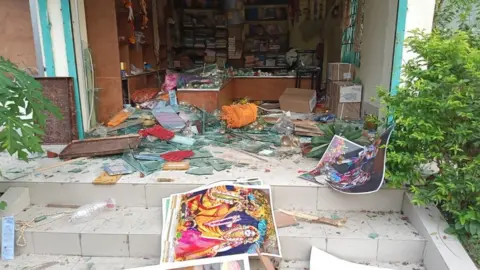
Ahmadiyya Muslims and indigenous groups in the Chittagong Hill Tracts have also been targeted. Lynchings have been carried out along with savage acts of revenge against Hasina’s Awami League supporters and minority groups that backed Sheikh Hasina.[3]
Journalists additionally face violence, legal persecution and state censorship under the new post-coup order.[4]

Al Rashid emphasized that Yunus has allowed Hizb ut-Tahrir, IS and al-Qaeda terrorists, who provided the nucleus for the August 2024 regime-change operation, to “openly fly red and black flags.” During Yunus’s time in power, these groups have destroyed museums, murals, sculptures and cultural symbols and razed hundreds of Sufi shrines and Hindu temples.
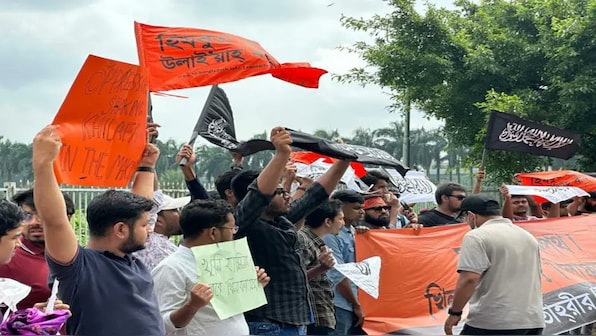
Based on his description, the situation is not too far removed from Syria, where U.S.-backed jihadists who toppled Bashar al-Assad in December 2024 have carried out a reign of terror targeting Shia Alawite and other minority groups, including Christians who supported Assad, and have also desecrated historic temples and Roman antiquities.

Al Rashid wrote that, in Bangladesh, Yunus has not just shielded the terrorists—he has “empowered them. His government includes terrorists as ministers, and those he couldn’t install, he patronized—allowing them to form a political party.”
As Bangladesh’s ambassador to Morocco, Al Rashid said that he was singled out in Yunus’s campaign of repression for writing a Bengali novel about Bangabandhu’s early years (1920–1942). Al Rashid writes that “Yunus’s hatred for our history isn’t mere contempt. It’s a deliberate, calculated attempt to erase Bangladesh’s very foundation.”
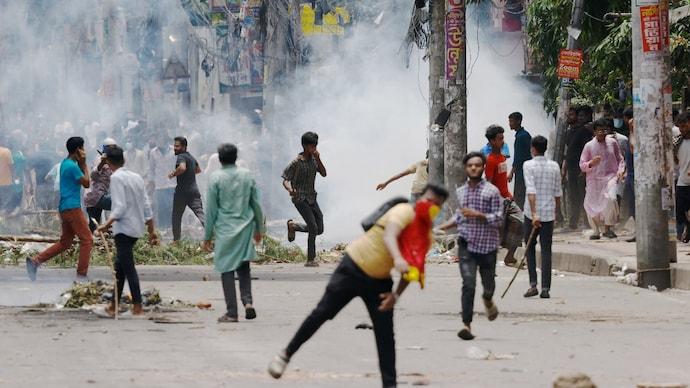
This sounds a lot like the Mohammed al-Jolani regime in Syria, which has waged attacks on Syria’s rich cultural heritage and is backed by foreign interests intent on carving up Syria for their own benefit.
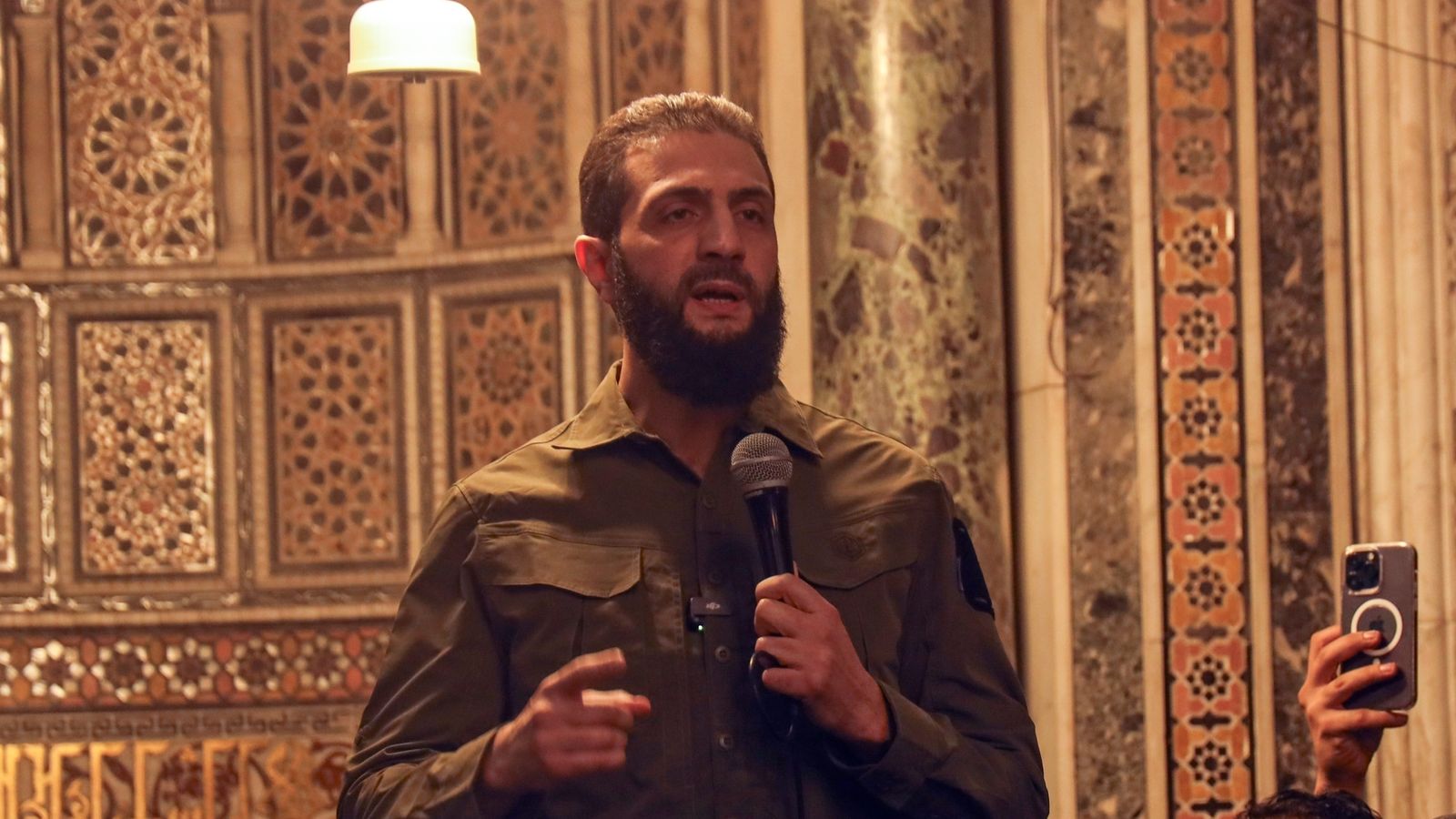
Al Rashid said that Bangladesh was born secular, and that Bangabandhu believed in reconciliation with Islamists who wanted to tear the country apart and establish theocratic rule.
Unfortunately, the Islamists murdered Bangabandhu in cold blood, and then overthrew his daughter, Sheikh Hasina, who was committed to the same principles.
Al Rashid wrote that, “if human rights violations were truly examined, an independent, impartial investigation would reveal a horrifying truth: the atrocities committed in just 15 days after her [Hasina’s] ouster—under Yunus’s protection—far exceeded those of her entire tenure. In those two weeks, Bangladesh descended into terror. Mobs lynched hundreds of police personnel—pregnant women begged for mercy, only to be slaughtered. Hundreds of Awami League supporters were beaten to death, their bodies left as warnings. Such barbarity, on such a massive scale, has not been seen in centuries.”
Again we see the parallels with Syria where head-chopping jihadists heralded in Western media as “moderate rebels” committed the same kinds of barbarities.
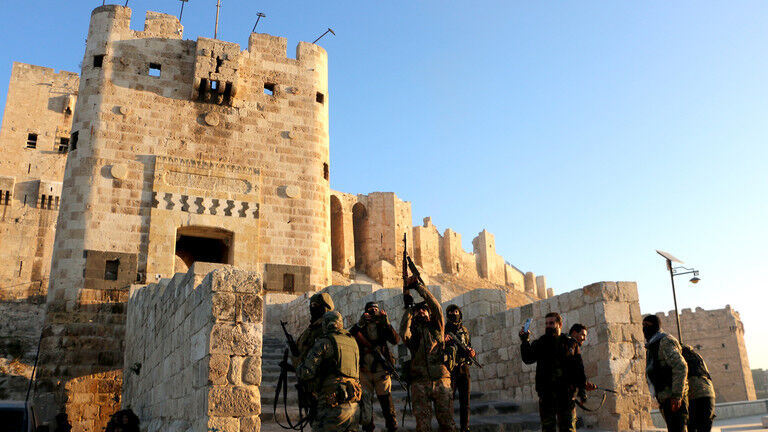
According to Al Rashid, when Sheikh Hasina’s government prosecuted Yunus for corruption, he painted himself as a victim—and the world believed him—though in reality he was a tax cheat who had plunged countless poor people into debt through his microfinance credit scheme. Al Rashid wrote that Yunus’s “greed knew no bounds.”
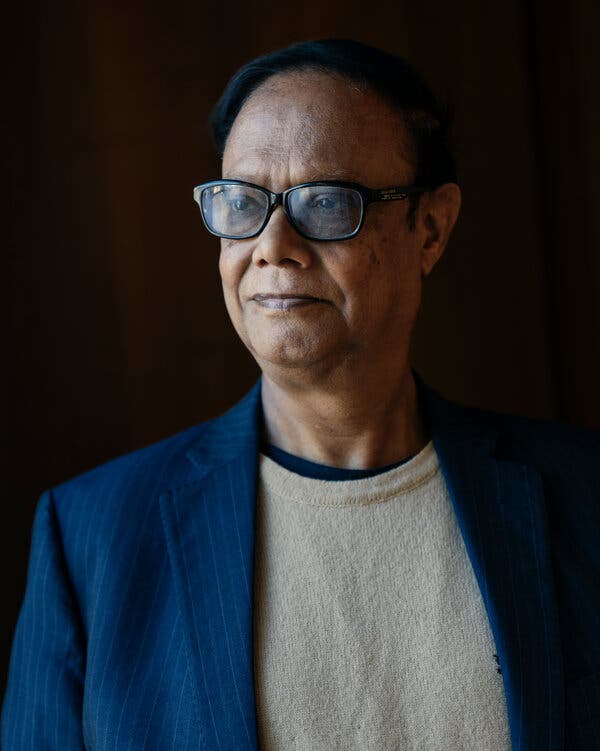
Now, Yunus’s government is making lots of noise about supposed corruption by members of the ousted former regime in Bangladesh and, so far, unevidenced claims about ill-gotten assets held in the UK and elsewhere.[5]
But this is extremely hypocritical in light of Yunus’s own track record and fact that the probe has deliberately avoided any investigation of the daughter of the head of the country’s central bank, Ahsan Mansur, who has amassed extravagant unexplained wealth that she flaunts online.[6]
Al Rashid pointed out that, in New York recently, Yunus had the audacity to introduce one of the terrorists who contributed to Hasina’s downfall, Mahfuj Aham, in the presence of Bill Clinton.
Al Rashid asked: “How would the French react if someone openly celebrated a terrorist responsible for the Charlie Hebdo massacre? How would Americans react if the mastermind of 9/11 were honored in New York, just as Yunus did? Bangladesh felt the same outrage, the same deep sense of injury and humiliation. This was not just an insult to our nation but an affront to justice itself.”
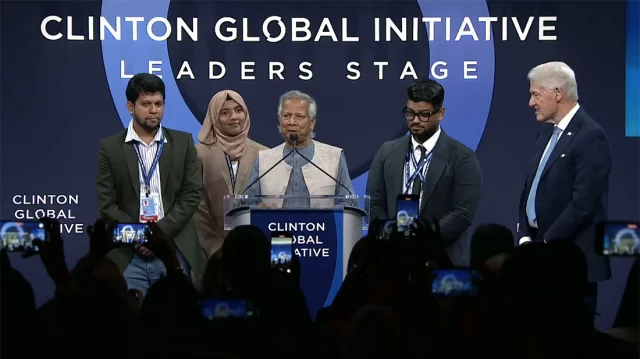

In 2021, the NED—a CIA offshoot specializing in propaganda and political subversion—provided grants worth $3.9 million to Bangladeshis. Much of the funding went to civil society pro-democracy groups to help them build opposition to the Hasina regime by spotlighting its human rights abuses and alleged corruption and by mobilizing opposition to the government, including through social media. Netra News, a Swedish-based news agency financed by the NED, has supported the Bangladeshi Nationalist Party (BNP) and served as a cheerleader for the protest movement and Yunus’s ascension to power while calling for Hasina’s resignation. ↑
For a critical view of Yunus’s Grameen Bank and microfinance schemes, see Tom Heinemann’s documentary, The Micro Debt. Grameen Bank received loans and grants totaling $2.2 million from USAID during Hillary Clinton’s tenure as Secretary of State. ↑
Between November 26, 2024, and January 25, 2025, there were 76 cases of attacks against Hindus in Bangladesh. Since August, reports have cited deaths of 23 Hindus and 152 attacks on Hindu temples in Bangladesh. A report by Transparency International cited 2,010 incidents of communal violence under the post-Hasina regime and the lack of effort to identify and punish the perpetrators. Chaya, a Hindu student in Bangladesh’s Khulna region, who is using a pseudonym because of fears of reprisal, told ABC News: “I have been crying all night, no [authorities] are here to help. Our house was attacked three times [since Hasina resigned]. The first time, no-one was home, and our gate was vandalized [and] set on fire. The second time, they looted the house and threatened to kill us. We had to run away.” ↑
According to Border Lens, a new law gives Yunus’s government “disproportionate authority” to access user data and censor online content. Journalists covering political protests and legal proceedings have been targeted in violent assaults. On February 5, 2025, supporters of the Bangladesh Nationalist Party (BNP) attacked journalists Javed Akhtar (ATN News), Hasan Jabed (NTV), and Azizul Islam Pannu (Deepto TV) outside the Supreme Court in Dhaka. ↑
It is claimed that Sheikh Hasina siphoned $17 billion from Bangladesh’s financial system, as The New York Times reported. ↑
The wealth that Mehreen Mansur flaunts includes fleets of luxury cars, designer goods and diamond-encrusted Cartier Roadster watches worth more than 10,000 pounds. ↑
CovertAction Magazine is made possible by subscriptions, orders and donations from readers like you.
Blow the Whistle on U.S. Imperialism
Click the whistle and donate
When you donate to CovertAction Magazine, you are supporting investigative journalism. Your contributions go directly to supporting the development, production, editing, and dissemination of the Magazine.
CovertAction Magazine does not receive corporate or government sponsorship. Yet, we hold a steadfast commitment to providing compensation for writers, editorial and technical support. Your support helps facilitate this compensation as well as increase the caliber of this work.
Please make a donation by clicking on the donate logo above and enter the amount and your credit or debit card information.
CovertAction Institute, Inc. (CAI) is a 501(c)(3) non-profit organization and your gift is tax-deductible for federal income purposes. CAI’s tax-exempt ID number is 87-2461683.
We sincerely thank you for your support.
Disclaimer: The contents of this article are the sole responsibility of the author(s). CovertAction Institute, Inc. (CAI), including its Board of Directors (BD), Editorial Board (EB), Advisory Board (AB), staff, volunteers and its projects (including CovertAction Magazine) are not responsible for any inaccurate or incorrect statement in this article. This article also does not necessarily represent the views the BD, the EB, the AB, staff, volunteers, or any members of its projects.
Differing viewpoints: CAM publishes articles with differing viewpoints in an effort to nurture vibrant debate and thoughtful critical analysis. Feel free to comment on the articles in the comment section and/or send your letters to the Editors, which we will publish in the Letters column.
Copyrighted Material: This web site may contain copyrighted material the use of which has not always been specifically authorized by the copyright owner. As a not-for-profit charitable organization incorporated in the State of New York, we are making such material available in an effort to advance the understanding of humanity’s problems and hopefully to help find solutions for those problems. We believe this constitutes a ‘fair use’ of any such copyrighted material as provided for in section 107 of the US Copyright Law. You can read more about ‘fair use’ and US Copyright Law at the Legal Information Institute of Cornell Law School.
Republishing: CovertAction Magazine (CAM) grants permission to cross-post CAM articles on not-for-profit community internet sites as long as the source is acknowledged together with a hyperlink to the original CovertAction Magazine article. Also, kindly let us know at info@CovertActionMagazine.com. For publication of CAM articles in print or other forms including commercial internet sites, contact: info@CovertActionMagazine.com.
By using this site, you agree to these terms above.
About the Author

Jeremy Kuzmarov holds a Ph.D. in American history from Brandeis University and has taught at numerous colleges across the United States. He is regularly sought out as an expert on U.S. history and politics for radio and TV programs and co-hosts a radio show on New York Public Radio and on Progressive Radio News Network called “Uncontrolled Opposition.”
He is Managing Editor of CovertAction Magazine and is the author of six books on U.S. foreign policy, including Obama’s Unending Wars (Clarity Press, 2019), The Russians Are Coming, Again, with John Marciano (Monthly Review Press, 2018), Warmonger. How Clinton’s Malign Foreign Policy Launched the U.S. Trajectory From Bush II to Biden (Clarity Press, 2023); and with Dan Kovalik, Syria: Anatomy of Regime Change (Baraka Books, 2025).
Besides these books, Kuzmarov has published hundreds of articles and contributed to numerous edited volumes, including one in the prestigious Oxford History of Counterinsurgency .
He can be reached at jkuzmarov2@gmail.com and found on substack here.


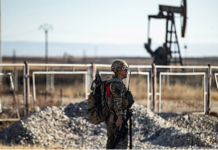


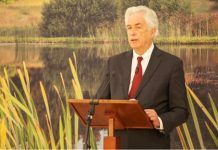


Sheikh Hasina who is praised in this article thought very highly of Bill Clinton as shown in this speech that she delivered on March 20, 2020
March 20, 2000
Prime Minister Hasina
Distinguished members of the press, on behalf of the Government and the people of Bangladesh, I would like to extend a very warm and special welcome to the President of the United States of America, His Excellency Mr. Bill Clinton, and distinguished members of his delegation. This is the first ever visit of a U.S. President to Bangladesh, and it reflects the warm and friendly ties between our two countries, as well as the qualitative formation that has been taking place in our relationship.
Let me also thank President Clinton for his decision to begin his tour of South Asia from the soil of Bangladesh. We are truly honored, Mr. President.
At this moment, I recall with gratitude the warm hospitality that was extended to me by the President and the First Lady during my brief visit to the White House in 1997. I’m proud to say that the father of the nation, Bangabandhu Sheikh Mujibur Rahman, imbued by deep and abiding values of freedom, democracy, and equality, achieved for us this nation. He laid the foundation of Bangladesh-U.S. relationship.
We value the relationship. It is a matter of satisfaction that these ties have grown substantially. It was, therefore, a singular honor for me today to meet President Clinton. He’s an outstanding leader and statesman of our times. We discussed our bilateral relations and issues of common concern, and I am happy to say that our meeting was fruitful and productive.
We reiterated to the President that the Government of Bangladesh shares the U.S. commitment to democracy, rule of law, human rights, and free-market policy. Like the U.S., Bangladesh also believes in peace, security, and in proactive efforts to defuse tension everywhere.
We appreciate the President’s efforts and initiative to bring the Middle East closer to a lasting peace and realize the important role played by the U.S. in achieving peace in Bosnia, Kosovo, and other regions.